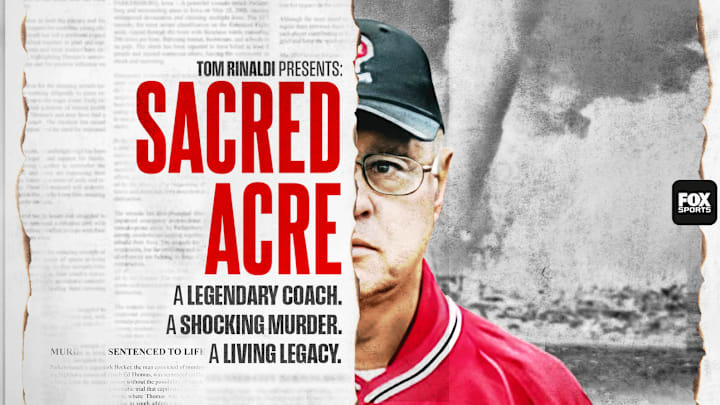Tom Rinaldi on His New 'Sacred Acre' Podcast and the Storytelling Process

Tom Rinaldi is not just one of the best storytellers in sports, he's one of the best storytellers. His journalism is intensely human and has the ability to reach down into powerful places. His new project, a six-part narrative podcast for Fox Sports, is no different. Rinaldi and his team explore the powerful life and stunning death of Ed Thomas, a legendary high school football coach in Parkersburg, IA, who was murdered by a troubled former player. Sacred Acre is propelled by intimate interviews with those who knew Thomas best. It chronicles the life and fallout from loss of life and what those can mean for an American community.
The first two episodes are available now and new ones will be released every Thursday.
Rinaldi, who is currently preparing to cover Ravens-Cowboys for FOX on Sunday, spoke to Sports Illustrated about his latest story and how he went about telling it.
SI: I wanted to start with the challenge of bringing rural Iowa to life. I've spent a lot of time there and it is not AT&T Stadium or Lambeau Field, something listeners can immediately understand. How did you approach that?
TR: I'm fortunate in that I've been to Iowa a number of times and to different parts of the state to do different stories across my career—one of the more recent ones being the Iowa Wave. I've gone to the Field of Dreams games and done some features there so I've been to Iowa at different times. I had never been to Parkersburg. I didn't cover the tornado or Ed's death when they happened. Iowa has a more undulating terrain in parts of the state than I think people might think. With that undulation comes a different kind of beauty. The beauty is striking in different seasons. To be there in winter, listen, it's an austere place but when you're there around harvest time in the fall or in the summer—as we've been for Field of Dreams and to do some of the reporting here—it is beautiful. The county where Parkersburg is, the portion of the state where Parkersburg is, it's very pastoral. There's a portion in the opening episode where we try to explain a bit about Iowa, obviously in very broad strokes. Trying to let people know that it really is a state and a place that is not densely populated. There are vast stretches of the state without a traffic light. That the notion of where you have the Mississippi bordering it, where you have the rich story of soil and agriculture. That is the beauty of this format. What we aspire to is that radio theater dynamic that can spark and engage a listener's imagination. And we try to do that through sound design and, hopefully, the clarity and simplicity of the writing.
SI: Have you always tried to do that? Just thinking about some of the stories you're most known for, it seems like a lot of them have that sort of vibe in that they transport the imagination.
TR: Obviously, the biggest difference here is that there are no pictures to rely upon. And so without that, Steve Porter, who is a phenomenal sound designer, who is really at the absolute center of a project of this scope, is so gifted and we're so lucky to have him. He's trying to draw that listener in with a handful of asset categories. Those categories are: the narration, the original interview sounds, the archival sound, the score, and the subtle use of sound effects. That blend of those five assets is real artwork. It's an alchemy. That's what we strived to do and create in the series so you can feel immersive while still leaving room for the listeners' imaginations.
SI: It's interesting to think about that. I'd say that 95 percent of the time I'm listening to a podcast it's just washing over me and not really activating my mind's eye. For this, it's a story that happened in Parkersburg but it reads like an American tale that could have happened everywhere.
TR: I think when you get to episode three, which centers around the tornado, hopefully your own imagination is triggered there in terms of your mind's eye filling in what a storm like that would look like as it approaches and the devastation it leaves behind in its aftermath. What are you filling in through your own engagement? What are you thinking about and picturing as you're driving or walking or otherwise dealing with the setting you're in when you listen? That's part of what we tried to do in this format.
SI: Okay, a very basic question. What initially attracted you to the story and what does it feel like at this point of your career to be so engaged with a story that you'll sink so much time and energy into it?
TR: I get to recognize in the stories that we tell—what are the themes that resonate most with me? What are the themes that I'm most drawn to? I landed on a trinity of themes, if you will. One of them is the line between living and dying. Nothing can compete with that. Number two is greatness and its cost. Number three is forgiveness. Those three themes to me are really powerful and they draw me in. There aren't too many stories where all three of those themes can be found. Ed's pursuit of his own greatness and the greatness of his players, which he achieved for a handful of them. Tragically, the line between living and dying. And then the ultimate human challenge—the thing that separates humanity from the natural world, which is our challenge to forgive. Because the natural world is unforgiving and for all the ways we screw up our natural world as human beings, we do have this capacity to forgive. That's challenging. In your life, you have asked for forgiveness at times and you have had to give it.
SI: It seems like everybody in our industry wants to have something to say. You strike me as someone who is very talented at, and passionate about, listening to people. How do you get good at listening?
TR: I think it comes from two places that are not always abundant. One is humility and the other is genuine and real curiosity. I'm amazed as I have been over so many years with these two things: what people bear and what people share. People are boundlessly strong when called upon to be so. That's what I've found. And I'm also amazed at people's willingness to share that because I think somewhere in them they have a hope that it might help someone else. Someone else who is going through something may gain. Of course there's elements of ego, there's elements of our own self-worth in sharing our stories, but I also think there's just as strong— if not greater—impulse to help others who are going through their own challenges and trials. In that sharing maybe people do feel a healing, they feel a connection. That's what I think draws me to listen.
SI: That idea of the line between life and death can be a binary story. When you sat down with those impacted by this tragedy, when did you first get the perception that this was nuanced and needed the space to breathe?
TR: One of the things most naturally as a starting point is to want to know what's happened since. There's a lot of people who know the story but there's also a great number of people who have never heard of Ed Thomas, that don't know what he means to the state of Iowa let alone to his community. So you're introducing people to that legacy. But what's changed since, what have we learned from it? What's the perception of mental illness and how Mark Becker is perceived? What has his family endured? How have they chosen to stay in Iowa and why? What's happened to Ed's sons and his grandchildren and his widow? What's happened to Mark's parents? All of those things. As well as going back and looking at some things that only time can heal. Only time can show us the shape of something 15 years down the road. One of the things that I think we had no idea would happen when we started over a year ago—we had no idea that, tragically, in the first week of 2024 there would be another school shooting in Iowa. One of the people killed would be close with the Thomas family. That gets revealed later in the podcast. That's a remarkable thing. While we tell the stories, the people who have lived them, their lives go on. So in some ways the dynamics of the story continue to change. And I feel like that's what happened to a degree with Ed's story and his legacy.
SI: What do you think is his legacy?
TR: I think it's a legacy of something I would call servant leadership. Ed led through service to others. The shape of the leadership initially came as a teacher and then as a coach. Then when his community was faced with almost an existential catastrophe—whether people would remain in Parkersburg and rebuild after a good portion of the town was leveled and decimated—he was the beacon people turned to. No, we're going to rebuild this community and as a symbol we're going to play 100 days from now. We're going to play our season opener so people can come out and do what they've always done in this community on a Friday night. That's not going to rebuild a house in itself but it's a powerful symbol of showing that we're resilient. He did that. Even most specifically with the Becker family, the fact that he introduced the mother and father of the player who killed him. The fact that the dad of the former player who killed him was one of Ed's first captains that he named. All of those things are parts of his legacy and that's one of the many reasons I think his story matters as much today as it did then.
